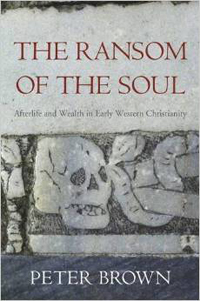 Peter Brown, The Ransom of the Soul; Afterlife and Wealth in Early Western Christianity (Cambridge: Harvard University Press, 2015), 262pp.
Peter Brown, The Ransom of the Soul; Afterlife and Wealth in Early Western Christianity (Cambridge: Harvard University Press, 2015), 262pp.
In his previous book Through the Eye of a Needle (2012), Peter Brown, professor emeritus at Princeton University and the leading historian of late antiquity, explored how Christians in the Roman Empire grappled with the words of Jesus to the rich young ruler: "It is easier for a camel to go through the eye of a needle than for a rich man to enter the kingdom of God."
His newest book turns from the role of wealth in this life to its connection with the soul in the afterlife. It takes its title from Proverbs 13:8, "The ransom of the soul of a man is his wealth;" and the words of Jesus in Matthew 19:21 and Luke 12:33 about storing up treasure in heaven. Jesus seems to say that there's a transfer of earthly treasure to heaven through alms giving, a spiritual reward for financial generosity.
Christians helped the poor for many reasons. There's no unchanging or timeless "master narrative" here, says Brown, only changing views and shifting arguments from the ancient world of the third century to the early Middle Ages of the seventh century.
Social solidarity, compassion, and charity are all obvious reasons to help the poor, but Brown is especially interested in how alms giving also became a "purely expiatory action" for the atonement of sin, "to heal and protect one's soul" --- a theme that's also explored by Gary Anderson in his book Charity: The Place of the Poor in the Biblical Tradition (Yale, 2013).
What can one know or expect about the afterlife and the "looming prospect of the Last Judgment?" Augustine was reticent on these matters, whereas others spoke in great detail and with absolute confidence. The questions piled up.
What's the difference between the special death of a saintly martyr, an impious reprobate, and the regular death of an ordinary believer — the vast majority of Christians who are average stragglers? Does burial beside a saint confer advantages? What about endowing a monastery (those engines of prayer)? What happens to the soul and the body after death? Is there a waiting period, or does one go instantly to Paradise? Since most of us are far from perfect when we die, do we need further purgation after death? And given the "porous boundary" between this life and the next, what can the living do for those dead who languish in the "tantalizing twilight between the glory of the saints and the black darkness of the reprobate?"
Brown admits that these questions are an "acute embarrassment" to moderns in general, and "abhorrent" to Protestants in particular. Having said that, one thing's for sure: we will all experience our own eschatological event at death. Then what? Just how are heaven and earth "joined by human agency?"


